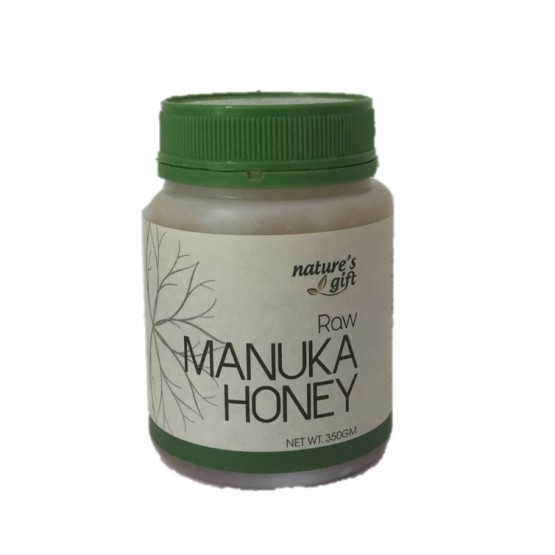RAW MANUKA HONEY – Size : 350gm
Nature's gift Manuka Honey has antibacterial properties which could be used to fight common disorders. Over 90% of people with ulcers and gastritis (a painful inflammation of the stomach lining) and 50% of dyspepsia (indigestion) sufferers are infected with a bacteria called helicobacterpylori. NewLife™ Manuka Honey can also fight the bug effectively and naturally, without the side effects which antibiotics produce
Manuka Honey has been valued since Egyptian times for its healing properties on wounds, burns and skin ulcers. It is the only honey known to have medicinal values. Its content interacts with enzymes to make it both antibacterial and antifungal.
The flower, which the bees thrive in, on New Zealand's Manuka Honey, which is more commonly known as the tea tree, has an extra antibacterial action. For stomach problems, one dessertspoonful of Manuka Honey should be taken four times daily before meals. There should be an improvement in approximately eight weeks.
Ingredient – Natural, Untreated, Unpastureised
Raw Manuka honey
Scientific trials revealed amazing health benefits
- A clinical trial reported that there were significant reductions in the duration of diarrhea caused by bacterial infection when honey was used as a rehydration fluid given to infants and children that were admitted to the hospital1.
- There was enhanced antioxidant capacity when honey was used, with a decrease susceptibility of heart lipid peroxidation2.
- Honey was found to be more effective than dextromethorphan (cough suppressant drug) in improving sleep and cough score in children aged between 2 to 17 years old3.
- The presence of natural hydrogen peroxide and flavonoids in honey interferes with platelet aggregation and blood coagulation, thus interrupts the thrombotic progress of atherosclerotic disease4
How To Take
For stomach problems, take one dessertspoonful of Manuka Honey, 4 times daily before meals.
The 21st Century Challenge
Antibiotics are used to kill or inhibit the growth of infection-causing bacteria. However, antibiotic treatment may impose adverse effects in some individuals. There may be cases whereby the bacteria become increasingly resistant to the antibiotic, meaning that the particular type of antibiotic is ineffective anymore in treating the condition. Moreover, antibiotics will disrupt the balance between the good and the bad bacteria in the gastrointestinal tract and diarrhea may be the result.
The solution: NewLife™ Manuka Honey
New Zealand doctors have discovered an alternative to antibiotics, which is Manuka Honey. Manuka Honey fights the bacteria effectively and naturally, without the side effects which antibiotics produce. This special honey possesses unique and highly beneficial immune supporting function.
All honey contain antibacterial component called hydrogen peroxide. However, the difference between Pure Raw Honey and Manuka Honey lies in the extraordinary antibacterial properties of Manuka Honey. Besides hydrogen peroxide, Manuka Honey from New Zealand has shown to possess special antibacterial factor known as the Unique Manuka Factor (UMF). This special antibacterial factor works hand in hand with hydrogen peroxide to produce a synergistic effect of high antibacterial activity. Most importantly, unlike hydrogen peroxide which is sensitive to heat, light, water and catalase effect on the body serum, UMF is relatively stable. It remains in the honey and does not lose its antibacterial strength over time. This contributed to its medicinal qualities that are not found in other honeys. Laboratory tests have found that Manuka honey is effective against a wide range of bacteria, which include:
Helicobacter pylori - this bacteria causes most stomach ulcers5
Staphylococcus aureus and Escherichia coli - the most common cause of infected wounds and (Methicillin-resistant Staphylococcus aureus (MRSA)5
Streptococcus pyogenes - causes sore throats5
Manuka Honey is regenerative and health enhancing. Its delicious flavor enhances any foods or beverages.
Manuka Honey:-
- Offers a delicious and healthy substitute for sugary sweets
- Helps enhance your body's immune response
- Soothes indigestion and other digestive discomforts
- Promotes healthy probiotics in your gastrointestinal tract
- Contains a number of free radical busting antioxidants that support your health
- Promotes energy and recovery
- A natural antiseptic and an excellent salve for topical burns, wounds and acne
- Provides soothing comfort for sore throats and coughs
Who will benefit from NewLife™ Manuka Honey?
Honey is suitable for people of various ages. However, it is advised that honey should not be given to children under 12 months. Before the age of 12 months, a child’s intestinal tract is not well-prepared to handle the intake of honey, which may become toxic and a potential threat to infants. For people with diabetes, it is advised to limit the intake of honey to 2 teaspoons a day.
References
- Haffejee, J.E. and Moosa, A. 1985. Honey in the treatment of infantile gastroenteritis. British Medical Journal 290: 1866-1867.
- Busserolles, J., Gueux, E., Rock, E., Mazur, A. and Rayssiguier, Y. 2002. Substituting honey for refined carbohydrates protects rats from hypertriglyceridemic and prooxidative effects of fructose. The Journal of Nutrition 132: 3379-3382.
- Allan, G.M., Korownyk, C. and Kolber, M. 2011. Do cough suppressants or honey help pediatric cough? Canadian Family Physician 57: 435.
- Ahmed, A., Khan, R.A., Azim, M.K., Saeed, S.A., Mesaik, M.A., Ahmed, S. and Imran, I. 2011. Effect of natural honey on human platelets and blood coagulation proteins. Pakistan Journal of Pharmaceutical Science 24: 389-397.
- Source: http://manukahoney.com/resources/research/index.html
Disclaimer: The contents on this page are not to be substituted for medical advice or diagnosis. The information presented here is purely for educational purpose. This is not a prescription for self-diagnosis or self-medication. Consult your own physician regarding the application of any opinions and recommendations with respect to your symptoms or medical conditions.

